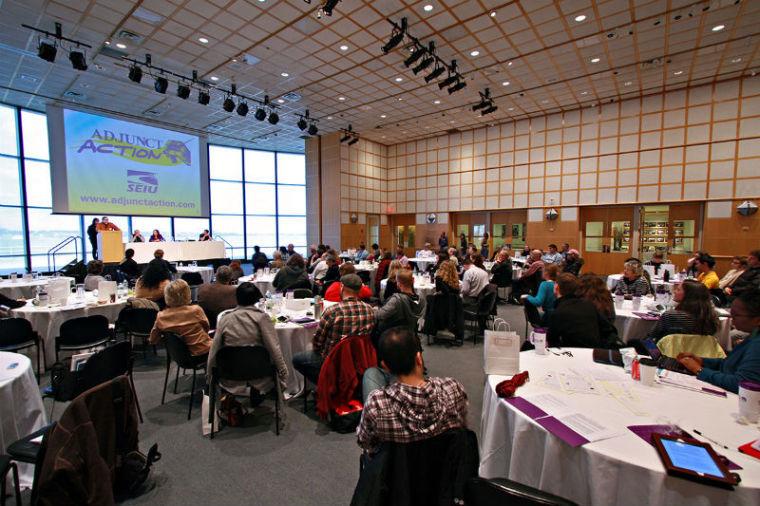Part-time professors, or “adjuncts,” are starting to unionize across the United States. A national movement called Adjunct Action is encouraging adjuncts to fight for better conditions. In particular, adjuncts involved in the movement are looking for better pay, money for research, job benefits, and inclusion in decision-making positions in the schools they serve.
The Service Employees International Union (SEIU) is behind the initiative. Avril Smith, the director of Communications for SEIU, said that the goal for Adjunct Action is to “improve job security and pay so it’s more sustainable.”
The campaign has already met with success in the Boston area. On Sept. 9, Tufts adjuncts will vote on whether to unionize. Bentley adjuncts will vote on Sept. 19.
Increasingly over the past few decades schools have been using adjuncts because, like part-time workers in any other industry, they come cheaper than full tenured professors.
According to the Adjunct Action website, “Between 1995 and 2011, the number of part-time faculty doubled, … [and] approximately 70 percent of instructional faculty at all colleges are working on a contingent basis.”
Amy Todd, the vice president of the Faculty Staff Union (FSU) at the University of Massachusetts Boston comments, “I know from first-hand experience that there are universities in Boston who truly abuse their adjunct faculty.”
Todd describes the employment conditions of adjuncts at other schools across the country. “They prevent them from becoming benefits-eligible. They force them to seek health insurance subsidies from the Commonwealth. They keep them in a state of constant fear and insecurity.
“Students are paying very high tuition to be taught by faculty who have no office space, no health insurance, no job security — whose library privileges are cut off on the last day of class every semester.”
Adjunct Action’s website asserts that “79 percent of adjuncts do not get health insurance at their college, and 86 percent did not receive retirement benefits or the opportunity to buy into a group retirement plan.”
Todd says, “It’s a moral scandal that has yet to be adequately publicized.”
As the Adjunct Action website explains, “54 percent of contingent faculty teach in more than one institution,” teaching classes on multiple campuses in order to make enough money. Adjuncts who must drive across town to another university are not able to meet with students after class, and the cost of transportation, while high, is not something most schools compensate their adjuncts for.
A UMass Boston adjunct who prefers that his name not be shared says that despite conditions being better at UMass Boston than other schools, work as an adjunct is not what most people teaching classes really want. “Unless you’ve got enough seniority to guarantee teaching from year to year, adjuncting is not tenable as a ‘career choice.’”
He adds, “I also need to spend my fall semesters on a full-scale global job search. These elements make it nearly impossible for me to commit my time or my emotional and intellectual energies to the students. They deserve better.”
At UMass Boston, part-time staff are included in the Faculty Staff Union, which is part of the Massachusetts Teachers Association.
Amy Todd believes the working conditions of part-time lecturers at UMass Boston are actually not as bad as elsewhere: “What is absolutely better here is that after crossing a certain threshold of service, lecturers are eligible for health and dental insurance, sick leave, and retirement benefits.”
The union has also fought and won for more protection for the part-time lecturers. Todd says, “[The union’s work] protects faculty against capricious dismissal, discrimination, nepotism, and other threats to job security.
“Of all the universities I have taught at, the treatment of non-tenure-track faculty at UMass Boston is by far the best.”

